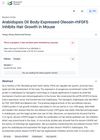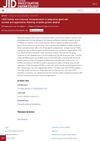 2 citations,
May 2023 in “bioRxiv (Cold Spring Harbor Laboratory)”
2 citations,
May 2023 in “bioRxiv (Cold Spring Harbor Laboratory)” Sebaceous glands can heal and regenerate after injury using their own stem cells and help from hair follicle cells.
1 citations,
April 2014 in “Dong-ui saengni byeongni hakoeji/Dong'ui saengli byeongli haghoeji” Samhwang-Sasimtang extract may promote hair growth and act as a natural hair growth agent.
 8 citations,
October 2020 in “International Journal of Molecular Sciences”
8 citations,
October 2020 in “International Journal of Molecular Sciences” Nonanal from fruits and vegetables promotes hair growth by increasing growth factors.

Exosomes from certain stem cells can promote hair growth and counteract hair loss caused by hormones by regulating growth factors and other cellular signals.
 5 citations,
January 2022 in “Molecular Medicine Reports”
5 citations,
January 2022 in “Molecular Medicine Reports” Pine bark extract helps mice grow hair by reducing inflammation and boosting growth factors.
 8 citations,
March 2022 in “Journal of The Taiwan Institute of Chemical Engineers”
8 citations,
March 2022 in “Journal of The Taiwan Institute of Chemical Engineers” Extracts from a type of brown seaweed can help promote hair growth.
 February 2022 in “Research Square (Research Square)”
February 2022 in “Research Square (Research Square)” A protein made in a plant stopped hair growth in mice.
 4 citations,
January 2012 in “Chemical Immunology”
4 citations,
January 2012 in “Chemical Immunology” Some drugs, especially biologics, can cause skin reactions that look like other skin diseases, and stopping the drug usually helps clear up these reactions.
 7 citations,
March 2021 in “Evidence-based Complementary and Alternative Medicine”
7 citations,
March 2021 in “Evidence-based Complementary and Alternative Medicine” Nelumbinis Semen extract helps hair grow and could prevent hair loss.
 April 2023 in “Journal of Investigative Dermatology”
April 2023 in “Journal of Investigative Dermatology” The research found that a protein called PPARg is important for the formation and healing of sebaceous glands, which can regenerate independently from hair follicles.
 12 citations,
January 2021 in “International Journal of Biological Sciences”
12 citations,
January 2021 in “International Journal of Biological Sciences” Scientists successfully edited a goat's genes to grow more and longer cashmere hair.
 7 citations,
January 2020 in “Frontiers in Pharmacology”
7 citations,
January 2020 in “Frontiers in Pharmacology” Jagged1 and Epidermal Growth Factor together significantly increased hair growth in mice with androgen-suppressed hair.
 8 citations,
May 2017 in “Chinese Journal of Integrative Medicine”
8 citations,
May 2017 in “Chinese Journal of Integrative Medicine” Miscanthus sinensis flower extract may help promote hair growth and prevent hair loss.
 11 citations,
July 2017 in “Regenerative Medicine”
11 citations,
July 2017 in “Regenerative Medicine” The patch assay can create mature hair follicles from human cells and may help in hair loss treatments.
 64 citations,
January 2015 in “BioMed Research International”
64 citations,
January 2015 in “BioMed Research International” Certain growth factors can promote hair growth in mice by activating hair growth-related proteins.
 154 citations,
November 2017 in “Development”
154 citations,
November 2017 in “Development” Fibroblast Growth Factors (FGFs) are important for tissue repair and regeneration, influencing cell behavior and other factors involved in healing, and are crucial in processes like wound healing, bone repair, and hair growth.
 26 citations,
May 2017 in “Lasers in Medical Science”
26 citations,
May 2017 in “Lasers in Medical Science” Laser therapy and hair growth factors significantly improve hair density in male baldness.
October 2022 in “Experimental Dermatology” New technologies show promise for better hair regeneration and treatments.
 19 citations,
April 2015 in “Developmental Dynamics”
19 citations,
April 2015 in “Developmental Dynamics” The conclusion is that skin and hair patterns are formed by a mix of cell activities, molecular signals, and environmental factors.
 December 2015 in “Vascular Pharmacology”
December 2015 in “Vascular Pharmacology” Hair papilla cells are crucial for blood vessel development in hair follicles, affecting hair growth and loss.
 August 2024 in “Journal of Cosmetic Dermatology”
August 2024 in “Journal of Cosmetic Dermatology” CGF injections may safely and effectively promote hair growth in androgenetic alopecia patients.
 7 citations,
March 2018 in “Asian-Australasian journal of animal sciences”
7 citations,
March 2018 in “Asian-Australasian journal of animal sciences” OCIAD2 and DCN genes affect hair growth in goats by having opposite effects on a growth signaling pathway and inhibiting each other.
 788 citations,
February 2007 in “Nature”
788 citations,
February 2007 in “Nature” The document concludes that skin stem cells are important for hair growth and wound healing, and could be used in regenerative medicine.
 February 2024 in “Archiv EuroMedica”
February 2024 in “Archiv EuroMedica” Annurca apple extract may help with hair growth and prevent hair loss.
 January 1999 in “Journal of S C C J”
January 1999 in “Journal of S C C J” Certain growth factors regulate hair growth cycles, male hormones affect hair cycles, and drugs like Minoxidil and Finasteride can stimulate hair growth and inhibit male pattern baldness respectively.
 January 2024 in “Journal of Cosmetic Dermatology”
January 2024 in “Journal of Cosmetic Dermatology” Microneedling combined with other treatments significantly improves hair growth in people with hair loss and is safe.
January 2022 in “Springer eBooks” Fibroblast growth factors are crucial for hair follicle development and regeneration.
 4 citations,
August 2017 in “Cosmetics”
4 citations,
August 2017 in “Cosmetics” The extract reduced sebum production and promoted hair growth.
5 citations,
April 2022 in “Pharmaceutics” Minoxidil nanoparticles significantly boost hair growth in mice compared to regular minoxidil.
 28 citations,
September 2019 in “International Journal of Nanomedicine”
28 citations,
September 2019 in “International Journal of Nanomedicine” Minoxidil nanoparticles can potentially be a more effective treatment for hair growth than current treatments.


























